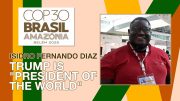
The World Economic Forum 2022 is underway in its traditional venue in Davos, Switzerland. Two and a half years into the Covid-19 pandemic, the annual confab of international corporate, financial, and political elites, which in 2020 announced a “Great Reset” of global affairs, continues its agenda-setting ways. Somewhat overshadowed by the drama of this year’s events — the war in Ukraine, the ever-evolving threat to Taiwan, and the imploding world economy among them — the World Economic Forum, by all appearances, is still working its globalist agenda items.
Klaus Schwab, the founder and longtime leader of the WEF, set the tone early, with a speech that left no doubt of the organization’s sense of privilege and purpose:
Let’s also be clear: The future is not just happening. The future is built by us. By a powerful community as [sic] you here in this room. We have the means to improve the state of the world. But two conditions are necessary. The first one is that we act all as stakeholders of larger communities, that we serve not only our self-interest, but we serve the community. That’s what we call stakeholder responsibility. And second, that we collaborate. This is the reason that you find many opportunities here during the meeting to engage into [sic] very action- and impact-oriented initiatives, to make progress related to specific issues on the global agenda.
As always, those “specific issues on the global agenda” include traditional canards such as climate change, sustainability, ending the use of fossil fuels, and preventing war. This year’s WEF, in keeping with “Great Reset” cadences related to the Covid pandemic and its economic and social aftermath, is also focusing on pandemic prevention and protecting vulnerable food production and supply chains. And, less explicably — at least from the standpoint of conventional logic — the WEF, while claiming custodianship of global problems, is also studying issues with little discernible global purport, such as limits on free speech on the internet (they’re in favor) and alleged discrimination against those practicing homosexuality, bisexuality, transsexuality, and kindred perversions (they’re opposed).
Some feeling for the gist of the WEF 2022 can be had from a sampling of agenda items from this year’s conference, which include the following:
- “Trading Places: Can Commodity Companies Become Climate Heroes?”
- “Why LGBTQ Representation Should be a Priority for Business and Media”
- “Beyond Pledges: Inclusive Partnerships to Move Towards Climate Resilience”
- “Safeguarding our Planet and People: A Call for Climate Action at Davos 2022”
Nor has there been any shortage of political movers and shakers at this year’s WEF. The conference has already heard from the likes of former senator John Kerry, Spanish Prime Minister Pedro Sanchez, European Commission President Ursula von der Leyen, and NATO Secretary-General Jens Stoltenberg. Traditional WEF participant Russia was disinvited to this year’s event, and the war in Ukraine is probably second only to climate change in prominence at Davos 2022.
While we all applaud efforts in good faith to address genuine global problems (with war, pandemics, and hunger certainly among them), it is unfortunate that the only efforts to combat them that ever get widespread publicity and media approval come from the globalist Left. The myriad private organizations, both religious and secular, that are striving to improve man’s condition are generally ignored or taken for granted by politicians and their breathless myrmidons in the mainstream news media. But organizations such as the Red Cross, Doctors Without Borders, and various churches and other religious organizations generally do not lead with the aim of finding “global solutions for global problems.” That is because, contrary to what the WEF and like-minded globalist initiatives would have us believe, it is possible to solve, or at least palliate, global problems without being globalists. A once-common and pressing global problem, hunger, for example, has largely been solved by the action of the free market, and many global health problems are similarly being mitigated thanks to heroic advances, mostly in open Western societies, in medicine. No global “framework,” “governance,” or “protocol” was necessary to achieve such milestones of human progress. And the global “Great Reset” supported by Klaus Schwab’s WEF is a government, not a private, global solution.




